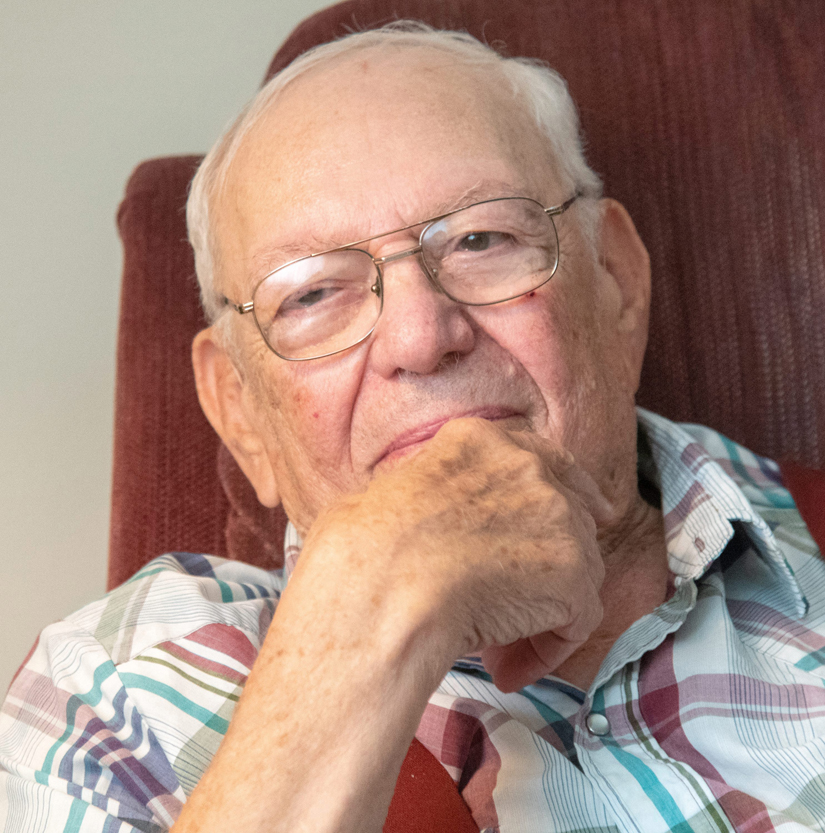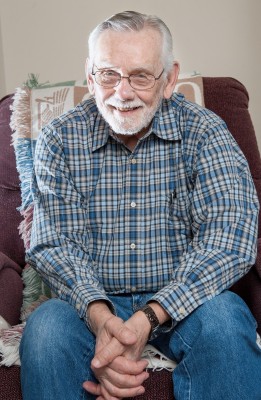Howard Ross
By Paul Wood

Photo By Robin Scholz/The News-Gazette
URBANA — Howard Ross earned the Purple Heart when Japanese troops zeroed in on his position in the last few months of World War II.
He says his foot is just fine; in fact, just recently, he threw out the first pitch in a doubleheader at Parkland College.
Tech Sergeant Howard Ross, 93, grew up on a Centennial Farm next to Willard Airport and went on to run it until his retirement.
He volunteered for the Navy “partly because of Pearl Harbor” but like many, didn’t get his first choice. He ended up in the Army in 1943.
After training in Texas, he’d earned a 30-day leave in Chicago.
That was followed by a train trip to California he remembers being three days long.
Three days to Oakland was nothing. The trip from San Francisco to the South Pacific took 30 days.
He remembers the evening the troop ship launched, a beautiful light shining on the Golden Gate Bridge.
They landed in New Guinea, taken back from the Japanese, where they stayed in a little camp.
Then his unit was put on a Liberty ship, a low-cost vessel that could be mass-produced. American shipyards built 2,710 Liberty ships between 1941 and the end of the war.
Liberty ships were called “Ugly Ducklings” by Time magazine, and their welded construction caused many problems.
They were surely not built for the comfort of the troops, Ross said.
Sanitation was poor — we’ll leave you to imagine what Ross said about it — and mess conditions were also poor. He remembers the bad food the mess doled out.
He served in the Army until 1946, when he was in the Philippines on a “clean-up mission.” Many Japanese were still fighting from the mountains, even after the war ended.
Ross’ unit moved north, close to the mountains, which gave the enemy the advantage.
“Any time they saw movement, they’d fire a mortar at us,” Ross said.
In February, Ross was sitting on a bank with his foot up “just relaxing” when a target appeared for the Japanese, a half-track with regular wheels at the front and a tank-like track in the rear.
“I think that stirred them up. A heavy mortar shell hit that half-track, and four men were killed,” he said.
Ross was hit in his left foot when the shell exploded near him.
After two weeks of medical care near the front, he was sent to a sanitarium taken over by the Army.
“I spent a month there, and my foot would not heal,” he said. “They had me go to another hospital in Manila and my foot still wasn’t healing.”
Then, Ross said, a colonel took a look at his foot and ordered hot packs. That’s when it finally started to heal.
Off dangerous duty, he went to work for “an old Army captain.”
The captain was pretty easy-going.
“He told us that when we got our work done, we could take off,” Ross said. “We’d get a Jeep and go up into the mountains. The Filipinos welcomed us.”
In retrospect, it was not a very safe day trip.
The war had ended, but not for all the Japanese.
“A pocket of them didn’t know the war was over,” Ross said.
He made it home in one piece, despite the shrapnel.
His wife had been pregnant when he left. He eagerly returned to his family, taking a plane this time, and waking up in California.
His foot was healed, and his dad asked him what he wanted to do now.
“Farm,” Ross told him.
He lived 42 years on that farm. At one point, his father bought hogs. At another, sheep.
“I loved them sheep,” Ross said. They kept the pasture mowed.
Do you know a veteran who could share a story about military service? Contact Paul Wood at pwood@news-gazette.com.
Read more stories from local veterans:
 Gene Richards
Major Gene Richards “walked through the rain, but didn’t get wet” in Afghanistan. The rain includes small arms fire, mor …
Gene Richards
Major Gene Richards “walked through the rain, but didn’t get wet” in Afghanistan. The rain includes small arms fire, mor …
 Melvin Parker
CHAMPAIGN — Melvin Parker joined the Army right after World War II, when it looked like there might be war with the Sovi …
Melvin Parker
CHAMPAIGN — Melvin Parker joined the Army right after World War II, when it looked like there might be war with the Sovi …
 Herman Schneider
RANTOUL — He watched Nazis on trial and saw monsters like Hermann Goering humbled — sentenced to death, Adolf Hitler’s f …
Herman Schneider
RANTOUL — He watched Nazis on trial and saw monsters like Hermann Goering humbled — sentenced to death, Adolf Hitler’s f …